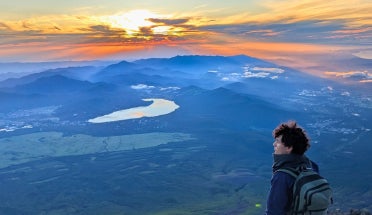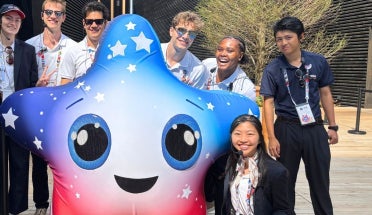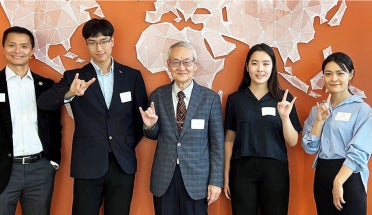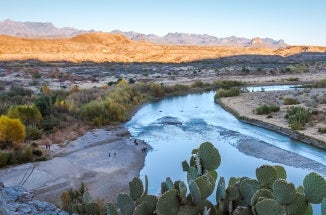
Global Career Launch Students Empower Cross-Border Water Research
- Jan 23, 2025
- Education Abroad
- by Alex Briseño
Celeste Flores, a graduate student seeking a dual master’s degree in global policy and public health at The University of Texas at Austin, had always dreamt of one day returning to Mexico after graduation and giving back to her hometown of Victoria, Tamaulipas.
“When I moved to Austin for college, I thought, ‘When am I going to be able to give back to the city?’ ” Flores said. “Working in politics isn’t easy, but I’ve always had this question in the back of my head.”
Her uncertainty around that opportunity would prove short-lived, however, after Flores discovered a Global Career Launch (GCL) program facilitated in Spring 2024 by Texas Global and led by David Eaton, the Bess Harris Jones Centennial Professor of Natural Resource Policy Studies in the Lyndon B. Johnson School of Public Affairs.
In partnership with the Texas Commission on Environmental Quality (TCEQ), the GCL program “Mexico: Trans-Boundary Environmental Issues” connects UT Austin students with opportunities at the forefront of water research, focusing on the rising salinity levels in the Rio Grande/Rio Bravo.
Increasing levels of salt in the Lower Rio Grande/Rio Bravo affect millions of people in the Texas and Tamaulipas region, Eaton explained. Salinity not only impacts domestic, commercial and industrial water use but also harms agricultural production, a major source of income on both sides of the river.
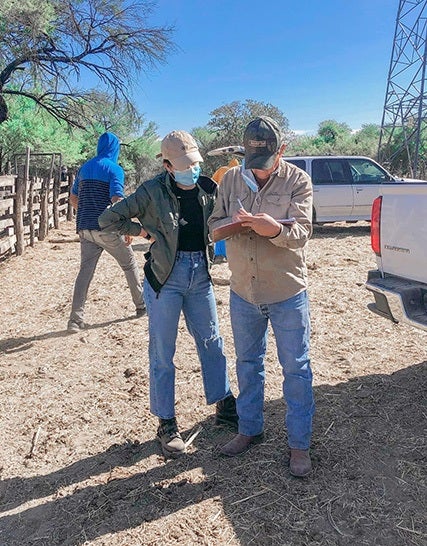
UT students from the GCL program working as interns have proven crucial to the implementation of research and innovation for partners on both sides of the border. Internship locations include Mexico City and Mexico’s four states bordering Texas: Nuevo León, Coahuila, Chihuahua and, notably for Flores, Tamaulipas.
“During the meeting, when I heard about a summer internship in Victoria, Tamaulipas, I asked, ‘Did I hear that correctly? There’s no way!’ ” Flores said. “For me, this opportunity to go back to my state through UT was such an important one. It’s still unbelievable that they gave me the funding and support to do this.”
Cultivating Cross-Border Collaboration
Global Career Launch, a Texas Global program, is an innovative global internship framework designed to help faculty lead undergraduate and graduate students in high-impact work and research experiences around the world.
Eaton’s GCL Mexico program revolves around an agreement struck by the U.S. and Mexican governments in 2023, authorizing an 18-month joint study to understand and respond to increasing salinity in the Lower Rio Grande River.
Supported by Texas Global and the Teresa Lozano Long Institute for Latin American Studies, there are currently 11 opportunities available in the GCL Mexico program for Summer 2025. Positions include internships with Mexico's National Water Commission (CONAGUA), Office of the Federal Attorney for Environmental Protection (PROFEPA) and the Secretary of Environment in Coahuila. Applications are open to UT Austin undergraduate and graduate students of all majors.
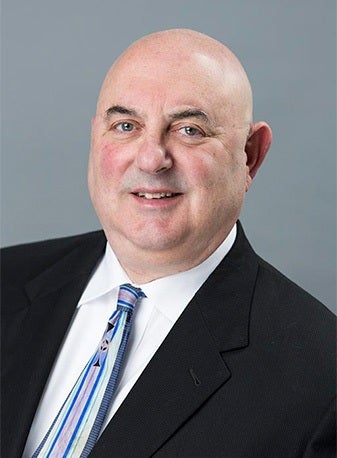
“I have a good story to tell you about cooperation between Mexico and the United States in solving a serious problem along our shared border,” Eaton said during a presentation at FILUNI 2023, a multinational book festival and conference that took place at Universidad Nacional Autónoma de México (UNAM) in Mexico City.
"This is the first binational, transboundary research study funded and supported by six different binational, federal and state water agencies involving research teams from two universities, UNAM and UT Austin,” said Eaton.
The study was implemented as a joint course between UT Austin and UNAM, allowing students to work with six sponsoring agencies in the U.S. and Mexico: TCEQ, Comision Nacional del Agua (CONAGUA), Comisión Internacional de Límites y Aguas, the International Boundary and Water Commission, U.S. Environmental Protection Agency (EPA) and La Secretaría de Recursos Hidráulicos para el Desarrollo Social of Tamaulipas.
“There’s never been anything like this. Everybody involved is happy with the outcomes of this study, and everything is open and transparent,” Eaton said. “All of our data — the U.S. data, Mexican data and the research by the students — is all available.
Eaton added, “The saline issue is a serious problem for the farmers on both sides of the border. This is giving information that's very helpful to the farmers. It's leading us in a constructive direction. [T]his is unambiguously helpful to everybody. That is why there is so much support, and it is truly bilateral between UNAM and UT.”
He also noted that students at La Universidad de las Americas-Puebla have also joined the team, conducting research and attending bilingual classes.
Returning to Tamaulipas
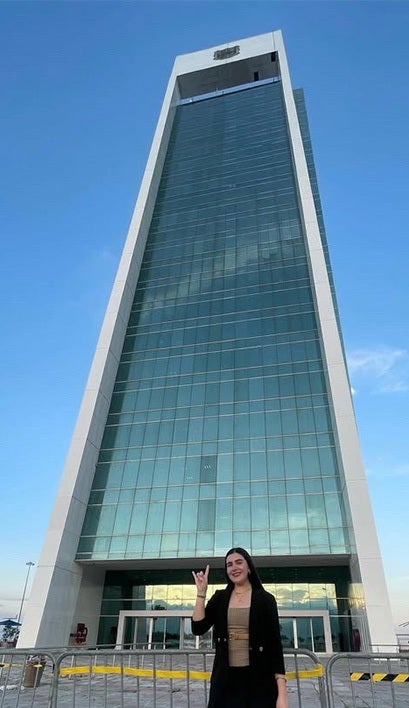
The research internship Flores landed that led to her homecoming was with the Tamaulipas government, specifically the Secretería de Desarrollo Urbano y Medio Ambiente (SEDUMA), TCEQ’s counterpart in Tamaulipas.
“I worked on two databases,” Flores said. “I focused on municipal solid waste, which is waste produced by people in their homes, from 2000-2050. From there, I worked on converting methane emissions from the landfills to energy.”
Flores extended her gratitude to several professors from the Lyndon B. Johnson School of Public Affairs for assisting with her research, including Eaton, Raj Patel and Alfonso Rojas-Alvarez.
During this internship, she confronted challenges of working with limited resources, such as incomplete data.
“As a master’s student in public health and global policy, I needed this experience to know how it felt working with incomplete data, finding my own data and knowing when to ask for help,” Flores said. “This is a skill we have to know. You might read about it and learn about it, but experiencing it is a whole different thing.”
Flores added, “I’ve gained so much admiration for the government workers because they’ve worked with this data for 20 years, and they make it work. The reports are of the same quality as what I’ve seen at UT.”
This specific experience, paired as it was with a work setting in a different government, is what Flores attributes to her expanded adaptability. It also brought a new appreciation for her colleagues in Tamaulipas and reminded her of a saying she grew up hearing: “Hay talento. Solo falta apoyarlo,” which translates to “There is talent. We just need to support it.”
As a citizen born in the U.S. who grew up in Mexico, the sharing of natural resources between the two countries could not be clearer for Flores, especially on the topic of water. Her summer research only reinforced that understanding.
“Being so close to the U.S., countries like Mexico are always going to be part of the work we do in the U.S.,” Flores said. “It’s always going to have an impact, so learning how the government and agencies work is crucial. Now, I have gained new insight and an understanding when I hear about policy developments in my state.”
The perspective-shifting experiences go beyond Flores’ work, though, such as when she found herself rediscovering her city and the community of Victoria last summer.
“I lived there for 17 years, and [while working there] I rediscovered a culture and food and people,” Flores said. “If that isn’t an example of what GCL provides in terms of gaining new perspectives and skills, then I don’t know what is.”
Expanding International Partnerships
Sam Stone, a public affairs master's student from Austin, spent the summer primarily in Mexico City working at UNAM but also traveled to create new initiatives with institutions such as la Universidad de las Americas Puebla in Cholula, Puebla, as an LBJ School intern.
The core component of Stone’s job — to assist the Mexico City team with water quality-related research — also took him to several universities throughout Mexico, where he met with various environmental and water quality teams to understand their current research.
“I work to see if there are ways for us to engage more with different regions or universities, such as exploring potential partnerships with UT or TCEQ,” Stone said. “During the spring and fall semesters, I worked for the TCEQ Border Affairs Division, which is focused on the Rio Grande and whether our farmers are getting enough water.”
Stone added, “They’re managing things related to the 1944 Treaty, which stipulates how much water and who is supposed to deliver it so that it can be allocated correctly. It’s a lot of diplomacy and water science, which is fascinating. It’s a cool nexus, and I love that.”
His office over the summer, located in UNAM's Engineering Department, is where Stone composed his written project and met daily with the UNAM team to discuss a hydrological modeling program that he had previous experience with.
“A hydrological model is kind of like a bank account,” Stone explained. “We’re trying to understand the natural processes, the ecosystem, human impacts — all of the things that might relate to poor water quality. It is a way of mathematically defining certain hydrological processes, such as how much water is leaving the river and how much water is coming in. It’s a mathematical expression of water dynamics.”
Describing the results, he added, “It went well. The trouble is not the conceptual stuff that I just described, but it's teaching the statistics and techniques for operating the code in the model and accounting for potential unknowns. The point was more about integration and not necessarily giving a full course on how to operate the model, but being a translator of sorts.”
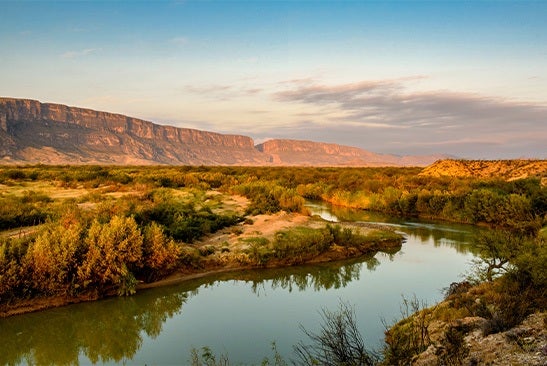
Stone added, “Advancing the cause for conservation and water-related research is such a team effort. The Rio Grande River is shared, and the more people who are involved and prioritizing collaborations, the better. The teamwork and diplomacy aspects are crucial because you're dealing with different cultures, backgrounds and perceptions. All of that plays into how well we’re able to create solutions.”
Unprecedented Impact by Students
As the manager of Border Affairs at TCEQ, Eddie Moderow plays a key role in connecting UT students with TCEQ’s counterpart agencies, both federal and state, working along the length of the Texas-Mexico border. UT, Texas Global and TCEQ bolster these partnerships while addressing binational concerns.
“There is no precedent for something like this, where students get to participate directly with U.S. and Mexican agencies on binational environmental projects. And we’re entering our fifth year now of students doing incredible work,” Moderow said. “It's not practice, it's not hypothetical. They're setting up programs, devising policy, presenting to commissioners and sitting in on conference calls with these two nations. Border politics can be fraught. In the ebbs and flows of political sensitivities and difficult realities on the border, environmental diplomacy saves the day.”
These opportunities were built on years of collaboration. The students work within the bounds of binational agreements such as the La Paz Agreement, the 1944 Water Treaty and Memoranda of Cooperation that TCEQ maintains with each of their neighboring Mexican states. Ultimately, the students fulfill and strengthen those agreements, Moderow explained. Each project is of high value to the governments involved, Moderow continued, which is why these dynamic interns are in such demand.
“The students come out of it really understanding themselves and how to work with our team in a binational setting,” Moderow said. “They’ve all got connections with TCEQ, EPA and other agencies. They learn the science and how it impacts human health and the environment, which does not recognize borders. And they also get to learn about Mexican government bureaucracy for three months on pertinent projects. It’s invaluable.”

